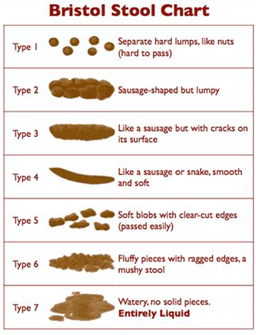Constipation in babies is a common concern for parents. It occurs when a baby’s stool is hard and dry, making it difficult to pass. In this article, we will discuss the signs and symptoms of constipation in infants and how to treat it.

Credit: drlogy.com
Signs of Constipation in Babies
- Your baby may show signs of straining when trying to pass a bowel movement.
- They may appear unsettled, fussy or irritated.
- Your baby may be eating less or not feeding as well as usual.
- A tear or crack might appear in the skin around the anus, which may at times bleed.
These signs may indicate that your baby is constipated and struggling to have a bowel movement.
Other Symptoms to Look Out For
If your baby is gassy but not pooping, there are other signs and symptoms to watch for:
- Excessive crying or irritability.
- Decreased appetite.
- Severe straining or turning red without pooping.
- Small, hard poops or dry poop when they do poop.
If you notice these symptoms, it is advisable to consult a healthcare professional for proper assessment and guidance.
Treatment Options for Constipated Babies
When it comes to treating constipation in infants, there are a few options to consider:
- Offering more fluids: Increase your baby’s fluid intake, especially if they are formula-fed. Breastfed babies may also benefit from additional hydration.
- Diet changes: If your baby has started solid foods, you can try introducing pureed fruits or vegetables with a high fiber content, such as prunes or pears.
- Tummy massage: Gently massaging your baby’s tummy in a clockwise direction can help stimulate bowel movements.
- Bicycle legs: Encourage your baby to move their legs in a cycling motion, which can help relieve constipation.
However, it is important to consult with your pediatrician before trying any home remedies or introducing any changes to your baby’s diet.

Credit: www.kennedykrieger.org
When to Seek Medical Attention
In most cases, constipation in babies can be managed at home. However, there are certain signs that may warrant a call to the doctor:
- Blood in the stool
- Fever
- Failure to pass any stool for more than three days
- Severe abdominal pain or swelling
If you notice any of these symptoms, it is important to seek medical attention for a professional evaluation.
Frequently Asked Questions On How Do You Know If Baby Is Constipated
How Does A Baby Act When Constipated?
When constipated, a baby may show signs of straining, being unsettled, fussy, or irritated. They may eat less and have a tear or crack in the skin around the anus. Look for signs of excessive crying, decreased appetite, severe straining, small hard poops, or dry poop.
Remember, if the bowel movements are soft, there is likely no problem. Treat constipation by ensuring a healthy diet and consulting a healthcare professional if needed.
How Do You Treat A Constipated Baby?
To treat a constipated baby, try gentle belly massages and bicycle exercises. Give small amounts of water or diluted fruit juice. Offer high-fiber foods like pureed pears or prunes. If these methods don’t work, consult a pediatrician for appropriate remedies.
How Do I Know If My Baby Is Gassy Or Constipated?
To determine if your baby is gassy or constipated, look for signs like excessive crying, decreased appetite, and straining without producing stool. Watch for small, hard or dry stools, and check for cracked skin around the anus.
How Do I Know If My Baby Is Straining To Poop?
Your baby may strain, cry, and turn red when passing a bowel movement, but soft stools are normal.
Conclusion
Constipation in babies can be a challenging experience for both parents and infants. By recognizing the signs and symptoms of constipation and implementing appropriate treatment measures, you can help alleviate your baby’s discomfort and promote regular bowel movements.
